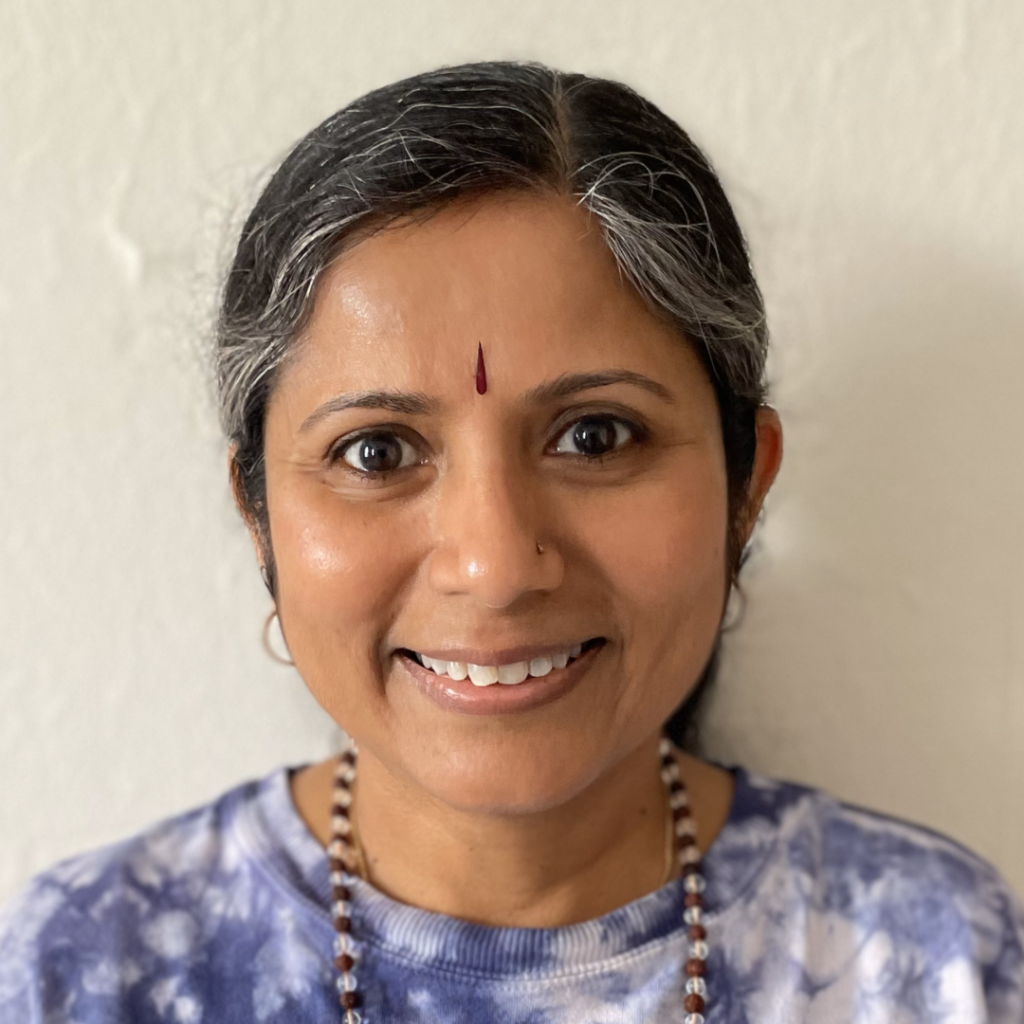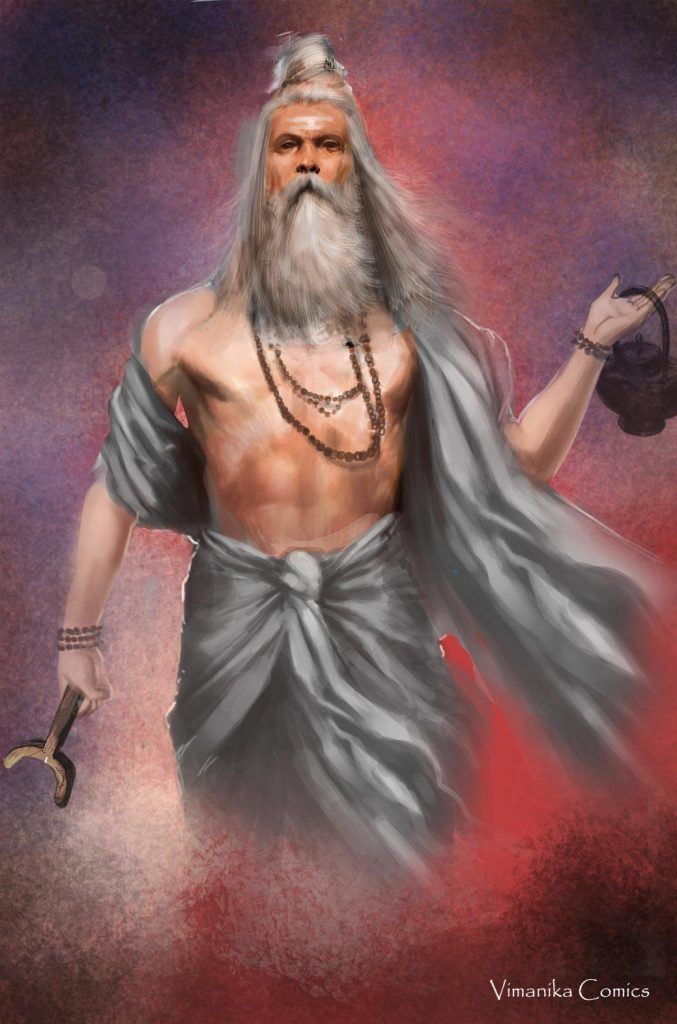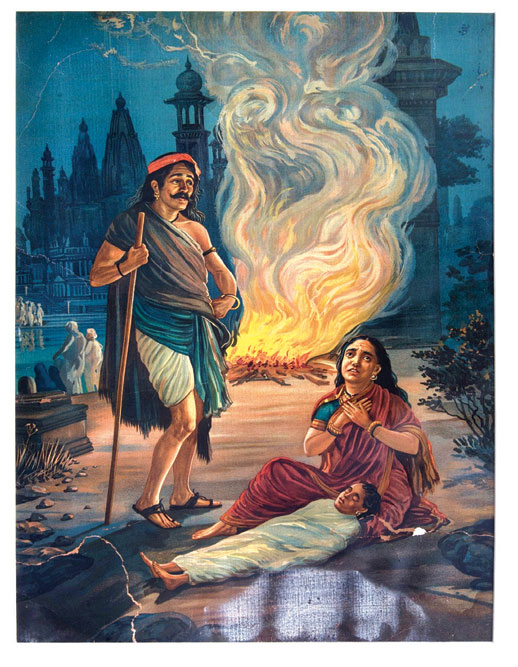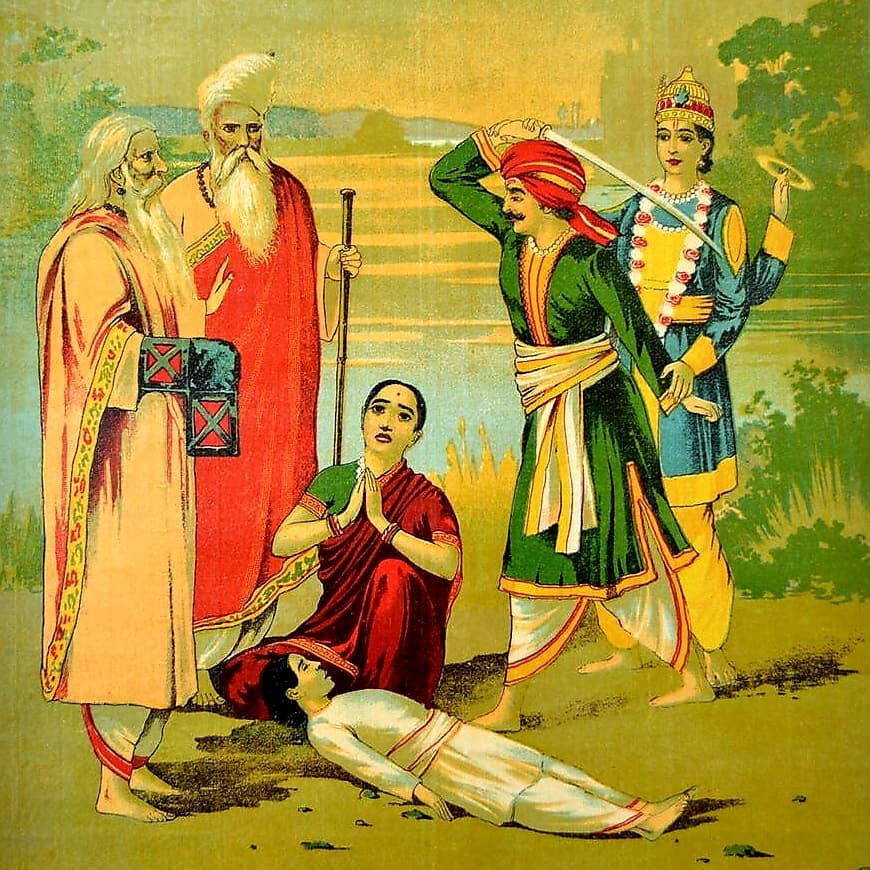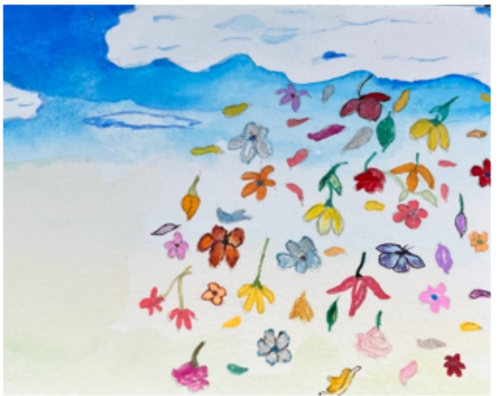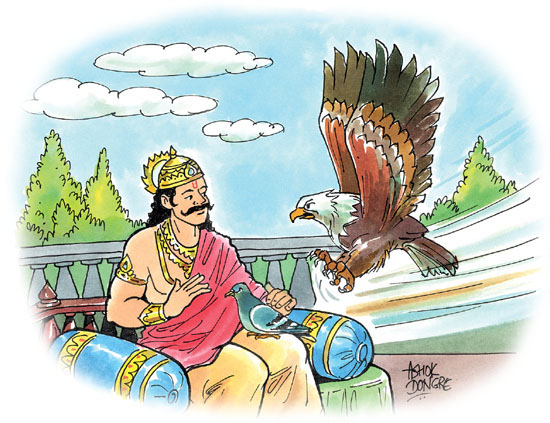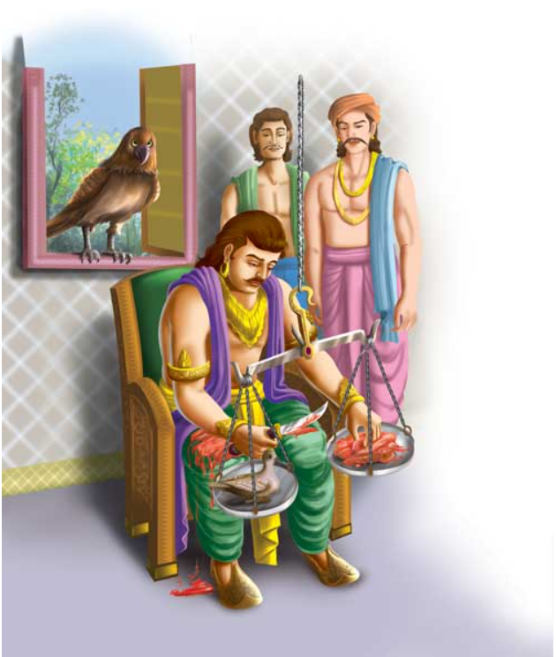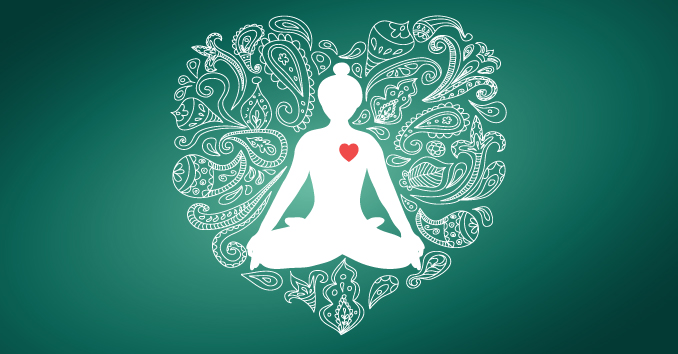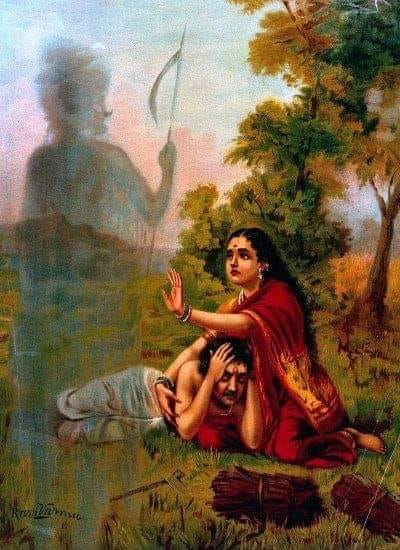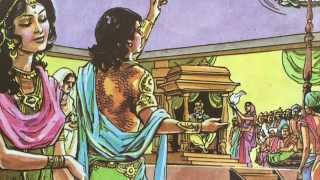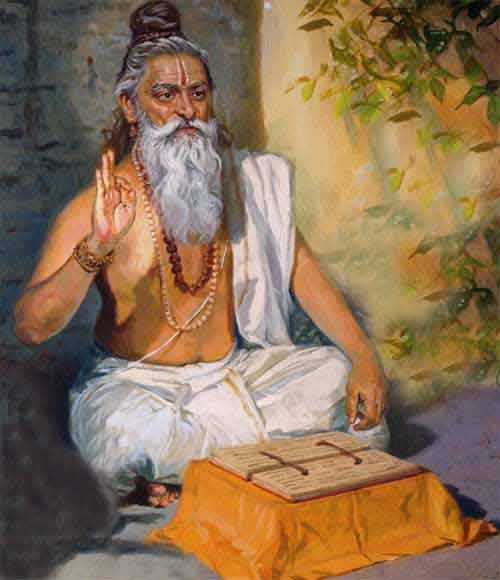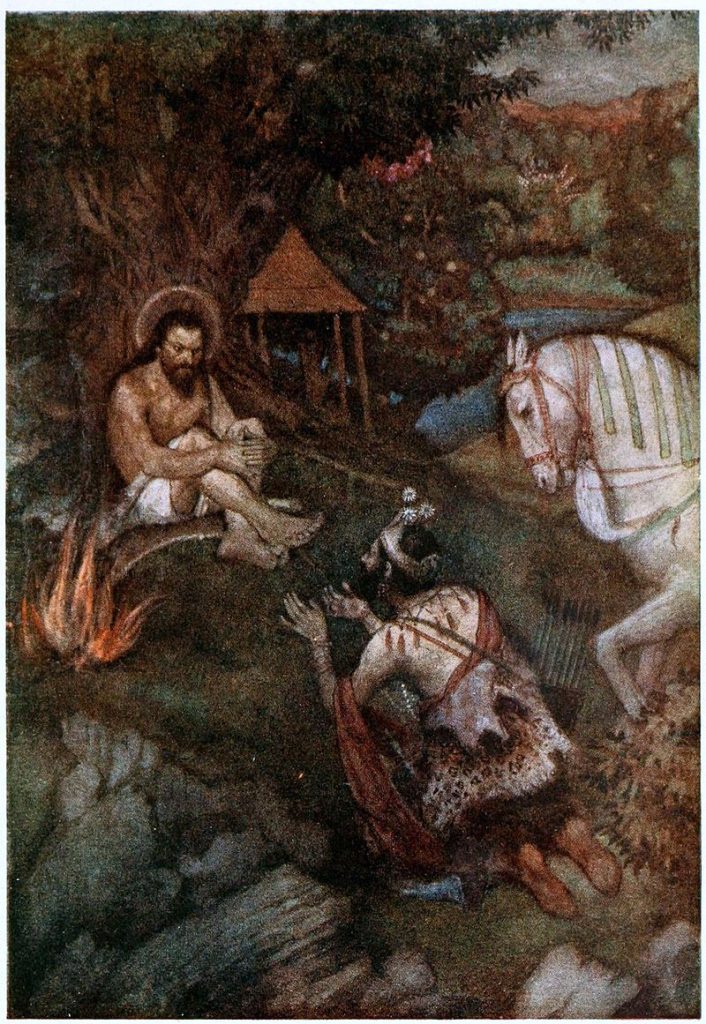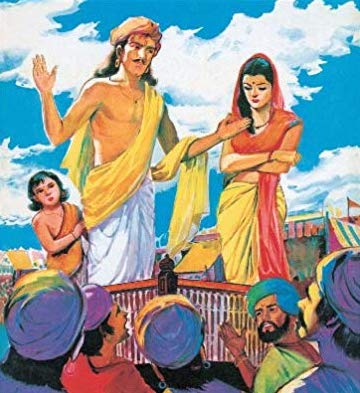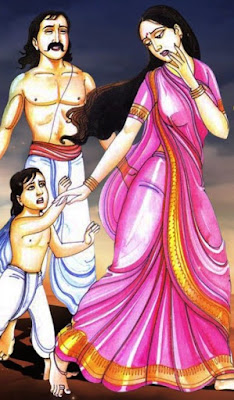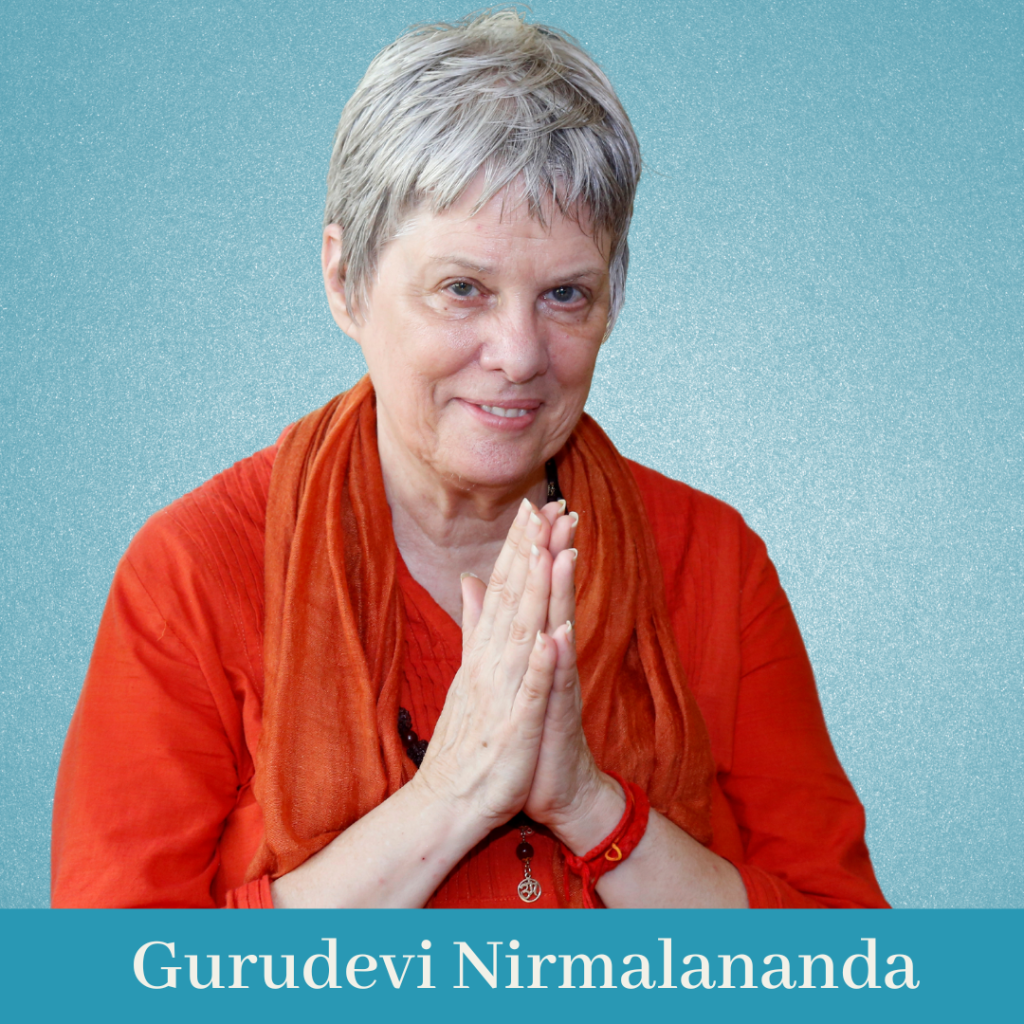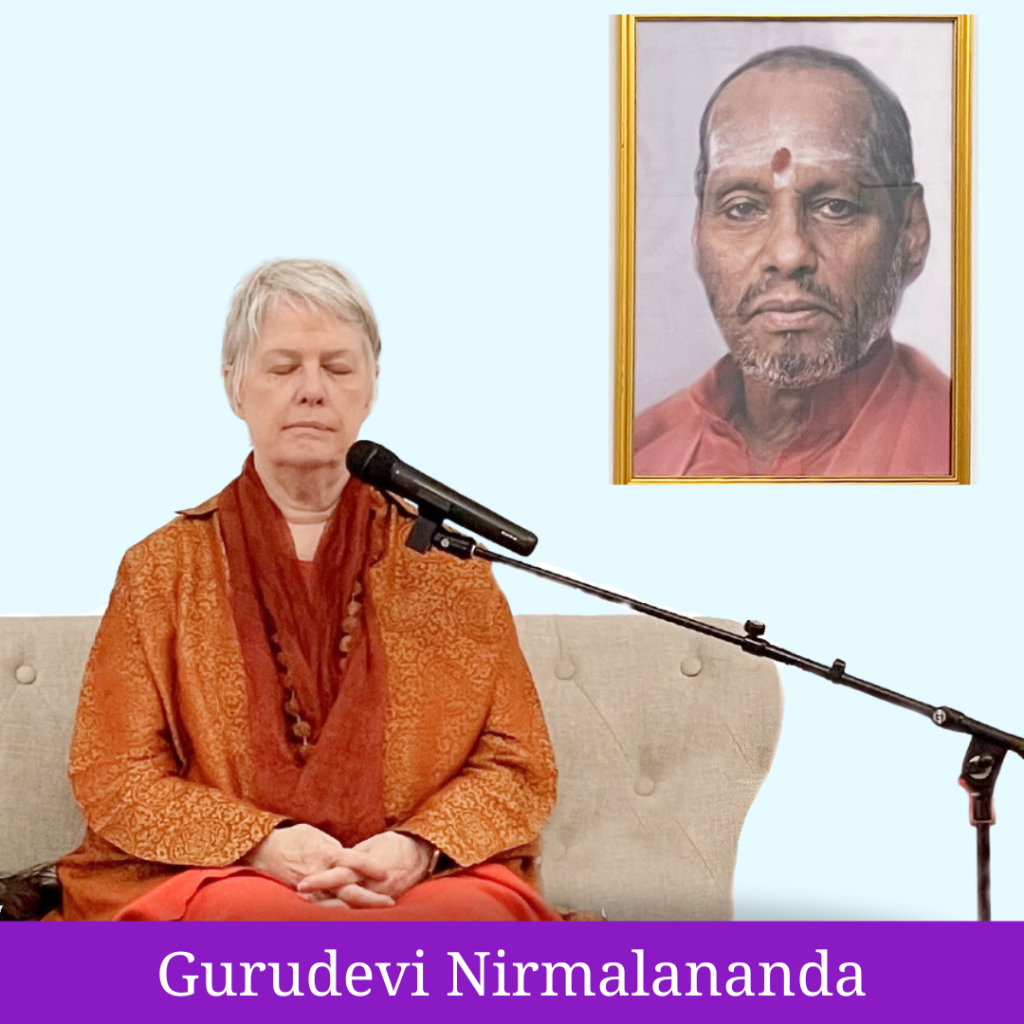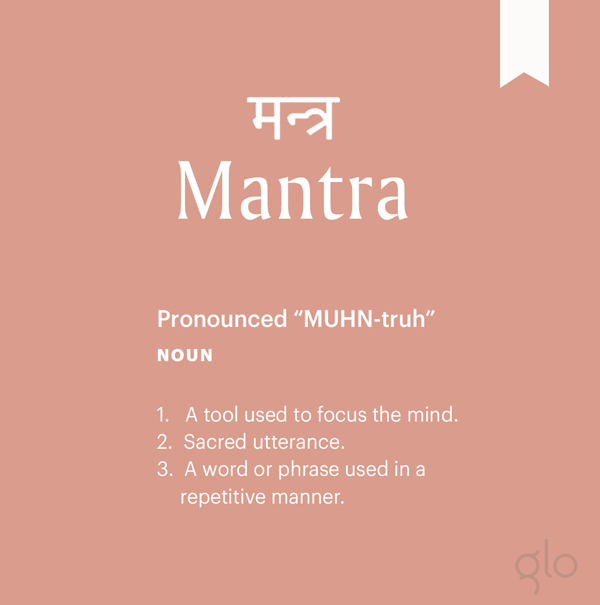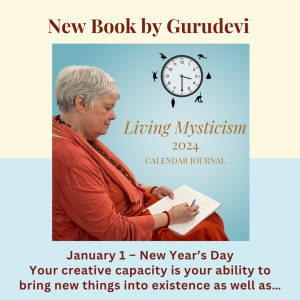By Nirooshitha Sethuram, Yogaratna
Graphics by Sheralee (Shambhavi) Hancherow
As Harishchandra’s son refused to leave his mother, he was sold along with his mother. Harishchandra hugged his son tightly to his chest, bursting into a stream of tears. His wife Chandramathi fell flat at her husband’s feet to get his blessings before departing.
The cruel-hearted old man who bought them, without mercy yelled at them to follow his lead. Harishchandra watched them leave, in desperation unable to do anything.
The sage Vishwamithra visited again and demanded the donation. Harishchandra happily gave all that he had from selling his wife and son. The sage wasn’t too happy with the donation and asked for more. Harishchandra didn’t have any other choice but to sell himself. He sold himself to a person who oversees disposing human remains. So, the great King Harishchandra’s duty was to burn off dead bodies. With this, he was not only able to settle all his debt, but also was able to lose his identity of being a great King.
Harishchandra carried out his new duty righteously, collecting the fees on time and giving it all to his master without missing a penny. After a while working at the cremation ground, one day around midnight Harishchandra found a woman half-clad, with her dead son on her lap. She looked completely exhausted as if she had been crying for a long time.
She asked for help from Harishchandra to burn her son’s body as she didn’t have any money to offer for the services. As much as he wanted to help the poor woman, he couldn’t do it as he was merely a servant to his master.
The woman pleaded with Harishchandra, saying that she was a servant of a stone-hearted old man, who was very unkind, and she needed to get back to work before sunrise. Harishchandra looked more closely at her.
Though he couldn’t see her face in the dark, he noticed the wedding necklace in her neck shining brightly, in contrast to all else that she was wearing and saying. He then demanded her to give the money, saying that she could get money with the golden wedding necklace she was wearing.
The woman was so hurt by this. She screamed with a loud voice saying, “Why am I still alive? If this cemetery keeper can see my wedding necklace, that means my chastity is going to be questioned. It’s only my husband who can see this necklace, according to the boon I had when I was born.”
Harishchandra immediately recognized that this woman in rags was none other than his beloved wife Chandramathi, and the boy lying lifeless was his son. He hugged his wife and the body of his son. He arranged a huge pyre, laying his son’s body on it. Harishchandra then told Chandramathi to go get the money from the master.
Even though Chandramathi was quite sure that she would not get a penny from her boss, to satisfy her husband she started running towards the master’s home. On her way she saw a young boy’s corpse on the streets. Her heart went out for this boy, so she dragged him from the street and held him on her lap.
Next thing you know, she was surrounded by royal guards. She was accused of killing the son of the king of Kashi for the sake of his jewelry. The thieves had run away with the golden treasures, abandoning the corpse, while Chandramathi’s fate brought her to this trouble.
Chandramathi was taken to the king. As she was in shock, she couldn’t say a word. With the evidence totally against her, she was charged with murder and treason. She was sentenced to be beheaded.
Chandramathi was taken to the cemetery by the royal guards. Harishchandra was called upon by his master and asked to behead Chandramathi. Harishchandra’s heart stopped for a moment. He could clearly understand the poor state of his wife. His hands trembled to even to hold the sword. He cried without knowing what to do.
Chandramathi addressed her husband in a very firm voice and said to him to uphold the righteous and to be truthful. Not to give it away for the sake of her life. She was willing to give up her life for her husband’s truthfulness.
When Harishchandra was just about to perform his action, Vishwamithra interfered. The sage said, “Oh king, why are you suffering like this? All you must do is refuse to do what you promised. I will give everything back to you.” He encouraged Harishchandra to lie to win his kingdom back.
Harishchandra and Chandramathi fell on the sage’s feet. They said that water purifies the body and truthfulness purifies the mind. That it is as precious as life itself, only that it is internal. For the sake of worldly life, we cannot give up on truth. Then they both got up and Harishchandra raised the sword to behead Chandramathi.
The sword went right to her neck, but what a miracle! As soon as it touched her neck, it disappeared, instead turning into a beautiful garland full of fragrance. The devas were blessing them with flowers raining down from the heavens. The public was taken by this blissful scene.
To everyone’s astonishment, their son Devadas stood as if he was waking from a deep sleep. Sage Vasishta was there, delighted to see Harishchandra and Chandramathi, and to witness the triumph of truthfulness.
Sage Vishwamithra was taken by all this and realized his mistake. He too blessed the couple, giving not only all Harishchandra had lost but also half of the powers of penance to the truthful king, as the sage had promised earlier. Harishchandra lived for a long-time, ruling Ayodhya righteously, continuing to be truthful.
Before returning to the Pandavas’ story, I will share one additional story the Pandavas heard from the great sage during their time in the forest.
Once, there was a noble and just king named Shibi. Born into a line of righteous rulers, King Shibi was known for his wisdom, courage and unyielding sense of justice. He was a descendant of the legendary Bharata dynasty. His father, King Usinara, was an equally revered ruler.
King Shibi was married to a beautiful and virtuous queen. Together, they had several children who were taught the importance of upholding dharma and leading a life of righteousness. The royal family was greatly admired and respected by the people of the kingdom for their kindness, generosity and dedication to their subjects’ well-being.
His fame spread throughout the world. News of his magnanimity reached even the heavenly realms. Indra, Lord of Heaven, wanted to test King Shibi to see if he was as great as his fame suggested. So Indra and Agni, the God of Fire, came down from heaven to test the King.
Agni assumed the form of a dove and Indra became a fierce eagle. Agni flew in front, fluttering his wings as if terrified with Indra following at a distance, as if in hot pursuit. They flew straight towards the king’s palace.
The frightened dove took shelter in king’s lap. As the King had vowed to protect those who seek shelter, even though in this case it was a bird, he decided to protect it.
The king comforted the dove with peace-filled words and he was ready to face the eagle. The eagle flew in, demanding the release of the dove as it was his prey. The righteous king realized that he was in a dilemma. While protecting the dove, he must fulfill the eagle’s hunger.
The eagle agreed to let the dove go if the king would offer equal weight of flesh from his own body, but without shedding a single teardrop. The King agreed to this demand. He called his guards and set up a scale where he placed the dove on one side and a large chunk of flesh from his right thigh on the left.
To his surprise the weight of dove was more. He added more, but even after additional flesh was added, the weight of dove was more. Even after cutting the whole of his right half of the body, the dove’s weight was not equaled.
As he is man of his words, he decided to offer the left side of his body as well. As he was about to cut the left side of his body, the eagle and the dove disappeared. In their places stood the Gods Indra and Agni. The Gods granted the king many boons. King Shibi ruled righteously for many years. After his death, he went directly to heaven to enjoy the fruits of his good deeds.
More to come…
- 2. Harishchandra, Chandramathi & son https://openthemagazine.com/columns/the-dilemmas-of-harishchandra
- 3. Sage Chandramathi, son & Harishchandra https://www.facebook.com/photo/?fbid=1868747543429115&set=harischandra-and-chandramathiharischandra-purana-mayana-kandam-happenings-in-cre
- 4. Flowers falling from heaven Illustration by S.A. Hancherow
- 5. King Shibi, dove (Agni) & eagle (Indra) https://www.boloji.com/articles/7052/shibi-rana
- 6. King Shibi cutting flesh https://www.sawanonlinebookstore.com/king-shibihttps://www.sawanonlinebookstore.com/king-shibi
